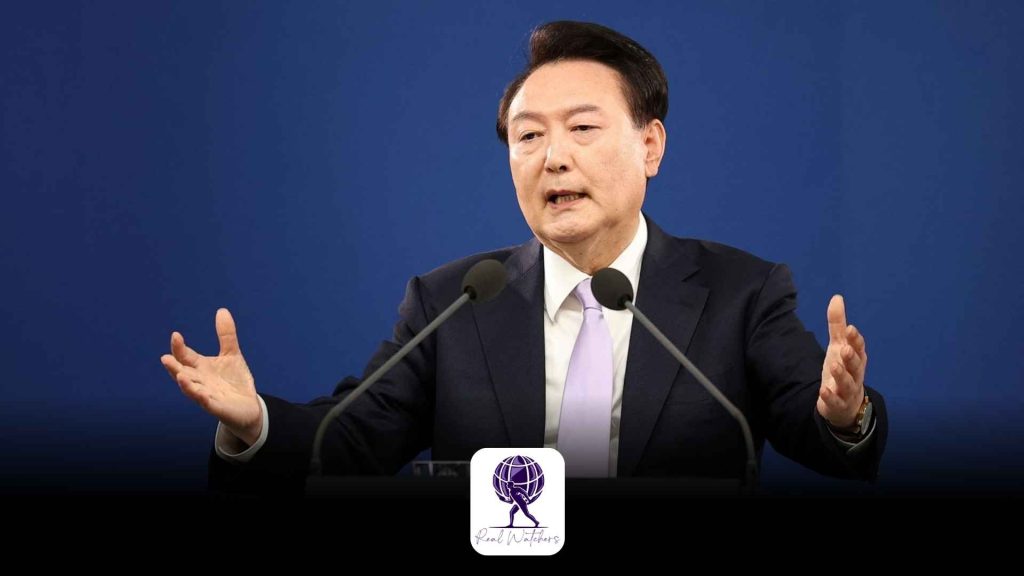Under siege, South Korean President Yoon Suk Yeol justified his unexpected move to impose martial law last week, asserting that the action was taken to safeguard the nation’s democracy.
In an unexpected televised address on Thursday, he characterized the attempt as a legal measure aimed at “preventing the collapse” of democracy and countering what he described as the opposition’s “parliamentary dictatorship”.
Yoon has indicated that he will not resign before a second parliamentary vote on his impeachment, scheduled for Saturday.
“I will remain steadfast, regardless of whether I face impeachment or an investigation,” he stated. “I am committed to persevering until the very end.”
Investigations into insurrection charges are currently targeting the president and his associates, leading to travel bans for him and several of his allies within South Korea.
On Thursday, the parliament, under opposition leadership, voted to impeach police chief Cho Ji-ho and justice minister Park Jae. The two officials involved have been immediately suspended.
In a notable distinction within the legislative process, impeachment motions targeting presidents necessitate a significant threshold of 200 votes in the 300-member National Assembly.
Conversely, the impeachment of other officials can proceed with a lower requirement of just 150 votes.
In his recent address, marking his first public statement following his weekend apology, Yoon refuted allegations that his martial law order constituted an act of insurrection. He asserted that his political opponents were engaging in “false incitement” to undermine his position.
Yoon reiterated several of his arguments during his martial law declaration, asserting that the opposition posed a threat and that his actions to seize control were aimed at safeguarding the public and upholding democracy.
Yoon emphasised his commitment to addressing his “legal and political responsibilities” without evasion.
On Saturday, opposition lawmakers’ efforts to impeach the president were thwarted when members of his ruling People Power Party (PPP) chose to boycott the vote. Opposition members are preparing to conduct yet another impeachment vote this weekend, pledging to continue this effort every Saturday until Yoon is ousted from office.
Choo Kyung-ho, the PPP’s floor leader, has resigned following the unsuccessful impeachment effort. In a decisive move on Thursday, the party appointed Kwon Seong-dong, known for his loyalty to Yoon, as his successor.
Kwon informed the press on Thursday that he plans to meet with PPP lawmakers to discuss continuing their opposition to Yoon’s impeachment.
Yoon’s party aimed to persuade the president to resign ahead of schedule rather than resort to forced removal from office.
Just moments before Yoon’s remarks, party leader Han Dong-hoon appeared on television, asserting that it was evident the president had no intention of resigning. Han has called on party members to cast their votes for his removal from office this Saturday.
On Thursday, the opposition introduced yet another impeachment motion, preparing for a vote scheduled for Saturday at 17:00 local time (09:00 GMT).
Should South Korea’s parliament approve the impeachment bill, a trial will take place in the Constitutional Court. A two-thirds majority of the court would be required to uphold the decision to remove Yoon permanently from office.
Since the opposition’s decisive victory in the April general election, President Yoon has found himself in a challenging position, struggling to advance his legislative agenda. His administration has primarily resorted to vetoing bills put forth by the opposition, reflecting a significant shift in the political landscape.
On the night of December 3, Yoon accused sympathisers of North Korea of attempting to undermine his government as he declared martial law.
The announcement has thrown the country into a state of political upheaval. In a tense standoff, protesters confronted security forces outside the National Assembly as lawmakers rushed to reject President Yoon’s directive.
Yoon rescinded his martial law order just hours after it faced obstruction from lawmakers.
Since then, the nation has continued to experience heightened tension. Massive protests and strikes demanding President Yoon’s impeachment have erupted, culminating in a raid on the presidential office on Wednesday. This comes as Yoon is embroiled in several investigations related to allegations of insurrection and treason.
In a troubling development, former defence minister Kim Yong-hyun, who stepped down following his controversial announcement of martial law, reportedly attempted suicide while in detention on Tuesday, according to officials. The individual is reported to be in a stable condition.








